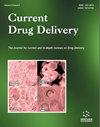多柔比星脂质体在非小细胞肺癌中的体外和体内试验:系统综述
IF 3
4区 医学
Q2 PHARMACOLOGY & PHARMACY
引用次数: 0
摘要
背景:多柔比星脂质体(Doxil®)是首批获准用于治疗实体瘤的纳米制剂之一。虽然在不同肿瘤的治疗方面已有丰富的经验,但目前还没有一组证据表明其对非小细胞肺癌(NSCLC)的治疗效果。我们就多西尔脂质体®对 NSCLC 的治疗效果和益处进行了系统性的文献综述。方法:在截至 2020 年的出版物(MEDLINE、Cochrane、Web of Science Core Collection 和 Scopus)中共发现 1022 篇文章。应用纳入标准后,数量限制在 114 篇,其中选择了 48 项检测,包括体外(20 篇)和体内(动物 35 篇,人类 6 篇)研究。研究结果最大抑制浓度(IC50)、肿瘤生长抑制率、反应率和存活率是评价 Liposomal DOX 疗效的主要指标。根据脂质体的大小、给药方式或靶向性,这些指标在体外和体内都显示出明显的优势,提高了游离 DOX 或非靶向脂质体的 IC50。结论在实验动物和 NSCLC 患者体内,Doxil® 可明显减少体外细胞增殖,提高体内存活率,并显示出最佳的安全性和药代动力学行为指数。尽管我们的系统性综述支持多吉美治疗 NSCLC 的益处,但仍有必要进行更多样本量更大的临床试验,以获得有关多吉美在人体中的活性和效果的更精确临床数据。本文章由计算机程序翻译,如有差异,请以英文原文为准。
Liposomal Doxorubicin In vitro and In vivo Assays in Non-small Cell Lung Cancer: A Systematic Review
Background: Liposomal Doxorubicin (Doxil®) was one of the first nanoformulations approved for the treatment of solid tumors. Although there is already extensive experience in its use for different tumors, there is currently no grouped evidence of its therapeutic benefits in non-small cell lung cancer (NSCLC). A systematic review of the literature was performed on the therapeutic effectiveness and benefits of Liposomal Doxil® in NSCLC. Methods: A total of 1022 articles were identified in publications up to 2020 (MEDLINE, Cochrane, Web of Science Core Collection and Scopus). After applying inclusion criteria, the number was restricted to 114, of which 48 assays, including in vitro (n=20) and in vivo (animals, n=35 and humans, n=6) studies, were selected. Results: The maximum inhibitory concentration (IC50), tumor growth inhibition rate, response and survival rates were the main indices for evaluating the efficacy and effectiveness of Liposomal DOX. These have shown clear benefits both in vitro and in vivo, improving the IC50 of free DOX or untargeted liposomes, depending on their size, administration, or targeting. Conclusion: Doxil® significantly reduced cellular proliferation in vitro and improved survival in vivo in both experimental animals and NSCLC patients, demonstrating optimal safety and pharmacokinetic behavior indices. Although our systematic review supports its benefits for the treatment of NSCLC, additional clinical trials with larger sample sizes are necessary to obtain more precise clinical data on its activity and effects in humans.
求助全文
通过发布文献求助,成功后即可免费获取论文全文。
去求助
来源期刊

Current drug delivery
PHARMACOLOGY & PHARMACY-
CiteScore
5.10
自引率
4.20%
发文量
170
期刊介绍:
Current Drug Delivery aims to publish peer-reviewed articles, research articles, short and in-depth reviews, and drug clinical trials studies in the rapidly developing field of drug delivery. Modern drug research aims to build delivery properties of a drug at the design phase, however in many cases this idea cannot be met and the development of delivery systems becomes as important as the development of the drugs themselves.
The journal aims to cover the latest outstanding developments in drug and vaccine delivery employing physical, physico-chemical and chemical methods. The drugs include a wide range of bioactive compounds from simple pharmaceuticals to peptides, proteins, nucleotides, nucleosides and sugars. The journal will also report progress in the fields of transport routes and mechanisms including efflux proteins and multi-drug resistance.
The journal is essential for all pharmaceutical scientists involved in drug design, development and delivery.
 求助内容:
求助内容: 应助结果提醒方式:
应助结果提醒方式:


